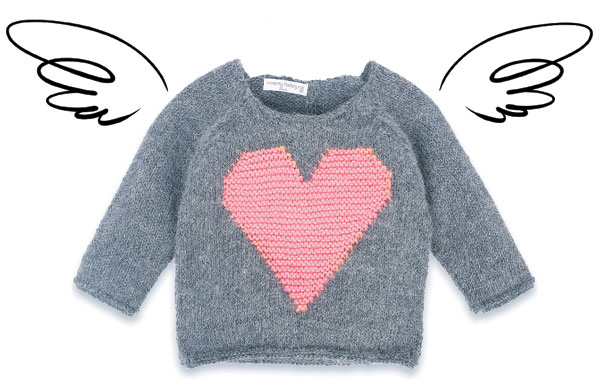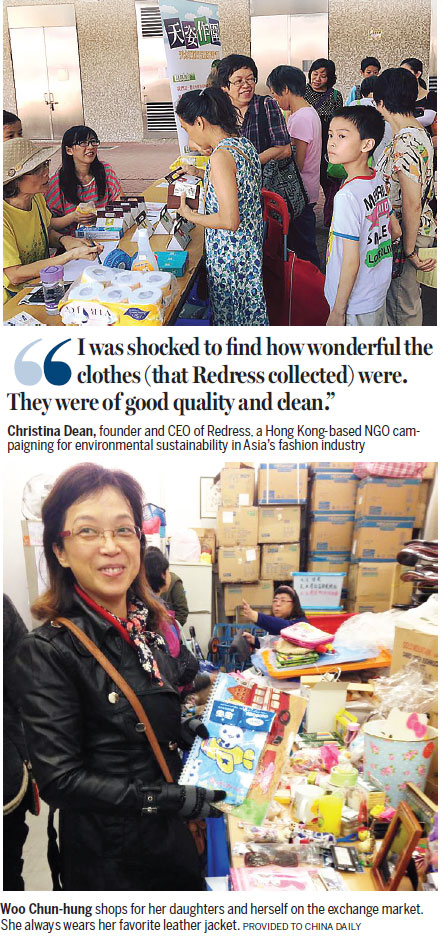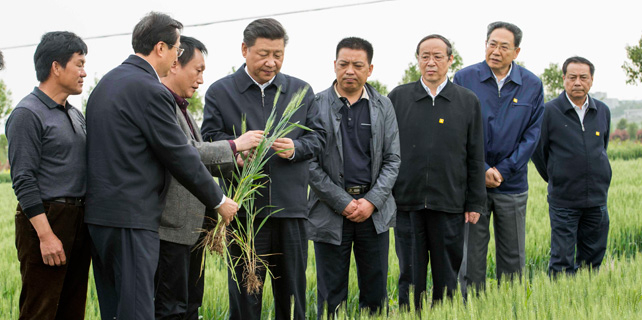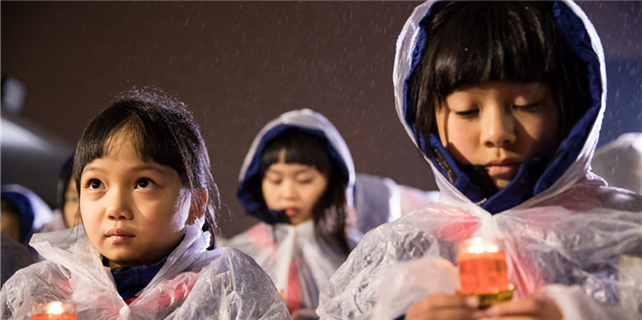A warm coat for an Angel
The rise of online shopping habits and 'fast fashion' mean people are rapidly discarding ever more clothes. But a number of green groups are turning trash to treasure for Hong Kong's underprivileged families. Wang Yuke writes.
There's an almost staggering volume of clothing in the city that falls into the category of things that get worn once and then are tossed aside, and never worn again. When Greenpeace did a study in June, it found that the value of that clothing all bundled together was about HK$3.9 billion. Greenpeace also found out that each Hong Kong resident owns an average of 94 pieces of clothing and 16 percent of it is seldom worn, if ever.
On the other side of the picture we have Woo Chun-hung, who is worried about her three kids. Cold weather moved in fast and Woo fretted because she can't afford warm clothes for them.
Many families are in this situation, living on a single income at minimum wage. Woo's husband hardly earns enough to cover food and shelter.


That's tough for a little girl like Angel Lam, the couple's youngest. She's like any other little girl and wants to dress up like a princess. She had this one dress that she loved. It was peach pink and printed all over with pictures of Pokemon, the popular Japanese cartoon character. Woo smiled as she looked at the photos of Angel in her pink dress. "She wore it everywhere," her mother recalled, "meeting her friends, visiting my friends, going out for dinner." Then one day another little girl said to Angel, "I always see you wearing this dress. Don't you have any other clothes?" There was a hint of sadness in Woo's voice as she recounted the incident.
Angel begs her mother to buy a nice dress. Most often Woo says no. When she finally does give in, Woo has to buy a dress like the one her daughter wanted, but a cheaper version and a few sizes too large so Angel doesn't grow out of it too soon.
"My friends asked me why I dress my daughter like she's a beggar," Woo laughed. It's not funny for Angel.
Woo beats herself up for not being able to clothe her daughters in nice clothes like the other parents in her kids' circle. Girls are always comparing themselves to their friends and tend to be self-conscious. Judgmental comments from others can undermine their self-confidence.
It's been this bad: When the family's second daughter Key Lam was going to secondary school, Woo couldn't afford to give her more than HK$15 for lunch. It was HK$5 extra for milk tea. Key couldn't afford milk tea and so felt ashamed in front of the other girls. "She cried. She told me because she couldn't afford even a cup of tea with her lunch, she had lost face with her classmates."
That's why the family even hangs on to old clothes. They may be threadbare and useless, but they can still keep them warm around the house. Outdoors is another matter. Woo dreads the days ahead when the temperatures drop.
Woo smiles as she recalls the day she brought home a brand new waistcoat for Angel which she'd picked up from the Christian Family Service Centre, a community charity. Angel jumped to her feet and slipped it on. It was a reversible, made of heavy cotton and sure to keep her warm in the worst that the Hong Kong winter could deliver. On one side of the coat was a checkered pattern. The other side was solid apricot. "She said she loved it because it was so warm and comfortable and that she didn't want to take if off."
Top threads
Green groups in Hong Kong collect unused and discarded clothing and recycle them to needy people. That has proven Woo's salvation in her unceasing quest to take care of her family and be a good mother. Woo anticipates the monthly exchange market fair by the community service group. She hopes she can find suitable winter wears from the market for Angel as she grows fast and many old winter clothes don't fit her anymore.
Tin Chi Chok Wai is another group that provides a token exchange platform for low-income families in Tin Shui Wai. Members can join in the group's organic farming efforts or other activities to earn tokens that they can exchange for second-hand necessities.
As long as she participates in more activities held by the group to earn enough token money, she can afford more clothes for Angel and make sure the girl is dressed up nicely and snugly. The middle one, Key, does not worry about scorn from her peers. She has her own network of friends. Woo doesn't have a full-time job because she has back problems. But she is able to manage to work as a part-time caregiver to help pay the bills.
Kid's wear is plentiful on the second-hand market as parents usually have a stock of hand-me-downs to give away. It'd cost Woo no more than a HK$10 token to buy a nice piece for Angel. Woo "bought" an artificial leather jacket for herself with a five-dollar token. "Wearing it, I can't be more confident," said Woo, beaming with pride.
Janis Fan Pui-ying, a social worker working with the project, has mounted an appeal asking people to give away their old clothes. Social workers assign each donated garment a token price based on its practical value. Fan remembers six months ago they received nine full bags of clothes from a resident who was about to move out. Some of the clothes on the exchange platform were donated from other local charities, about 2,000 pieces coming in every year.
Fan says most clothes they collected were quite new without stains or damage. Some even had their original price stickers on them. Identical team uniforms were often delivered in bulk, presumably after being worn once or twice.
Woo said she couldn't understand why the clothes she received were ever trashed in the first place. "See this corduroy overcoat? It was given by the Tung Wah Group of Hospitals. It's perfect for early winter. And this long linen outfit from Esprit (a fast fashion brand), this sleeveless striped dress from Wanko (another fast fashion brand)" Woo demonstrated.
Spinning wheel
Fast fashion and online shopping are a couple of factors suspected for all the consumerism. It is not the fast fashion per se that's to blame for the all the waste, suggested Yan Chan, director of business development of the Hong Kong Research Institute of Textiles and Apparel (HKRITA). Instead, it is the population explosion that has triggered unprecedented demand for clothing, with fast fashion arriving as a solution in the apparel industry. Fast fashion features cheap trendy garments that ensure average consumers can afford the latest fashions. Clothes from fast fashion brands are inexpensive because the suppliers come up with economic approaches to streamline production and cut down manufacturing costs.
The emergence of fast fashion is also a response to the circular economy which promotes waste reduction and pollution in business operations, Chan said. In the past when mass production dominated, a large quantity of clothes could be left unsold at the end of the season, to be stored and sold later at a lower price. The business model adopted by fast fashion brands helps to address the inventory problem since fast fashion features production in small quantities aimed at quick turnover. "When a new design comes out, they tend to manufacture the design in a small batch and put it onto the market to see consumers' reaction. If the feedbacks are positive, further production will ensue. Otherwise, they'll come up with another new design," Chan explained.
The churn of new designs and styles essentially shortens the production cycle and speeds up design turnover. Fast fashion chains today restock their products once a week rather than once or twice a season, which customers like, while the brands offer wide varieties of styles to meet the appetite for individuality. More styles spur more purchases.
The boom of online shopping is also responsible for increasing waste. That could be the number one reason why so much clothing goes to waste in Hong Kong, argues Christina Dean, the founder and CEO of Redress, a Hong Kong-based NGO campaigning for environmental sustainability in Asia's fashion industry. Research from 2015 found that Hong Kong online consumers spent four times more on apparel than people the US.
"I was shocked to find how wonderful the clothes (that Redress collected) were. They were of good quality and clean," said Dean. Since 2012, Redress has collected approximately 13 metric tons of second-hand clothing around Hong Kong.
In fact, only a fraction of them were from fast fashion brands; quite a few appeared to have been bought from online shops.
Once they have collected the binned apparel, staff from Redress sort it based on seasonal application or which groups would most likely benefit from it. Then the clothes are distributed to the right charities. Babywear will go to charities caring for mothers and kids, while old people's apparels will be sent to service centers for the elderly.
Donating to families in need is one way to reduce clothing waste. An alternative is to have them recycled, where technologies come into play. Textile waste is a chronic threat to the environment, and HKRITA has begun a project with fast fashion brand H&M to develop advanced technologies for textile recycling. Chan says that a lot of clothes today are made of a mixture of polyester, cotton and wool, which poses a challenge in the recycling process. Separation is the first step, and the next is recycling. Chan emphasized HKRITA holds a fashion summit regularly to educate the public on the alarming textile waste and the hardships of people in need.
Contact the writer at jenny@chinadailyhk.com
















